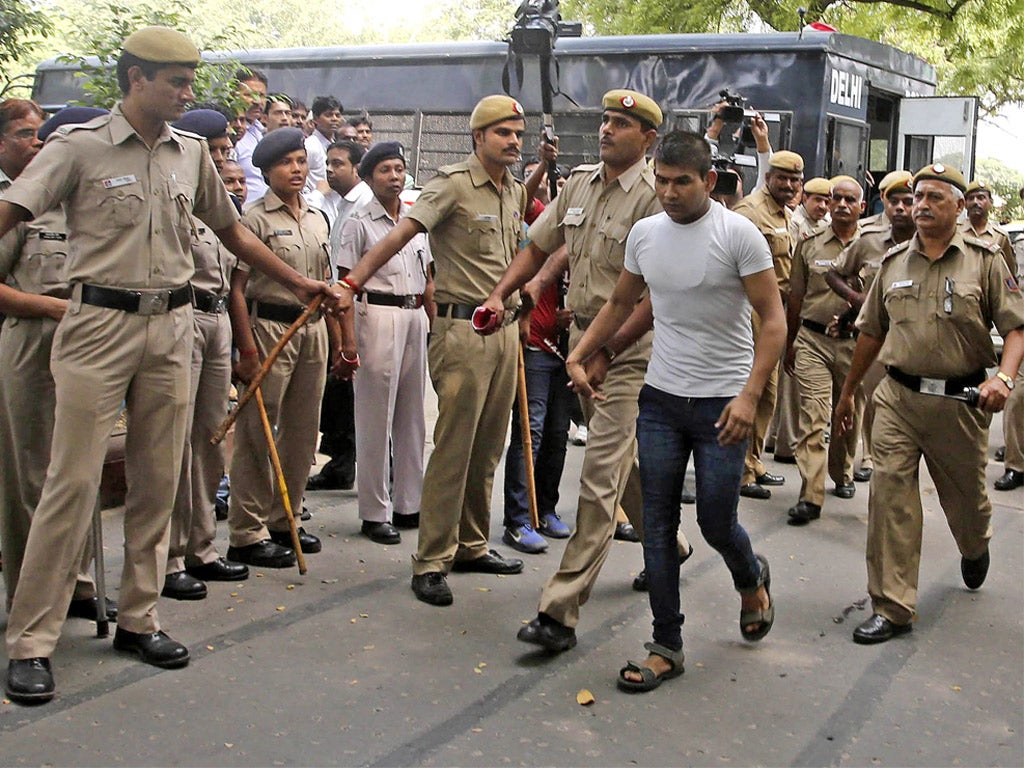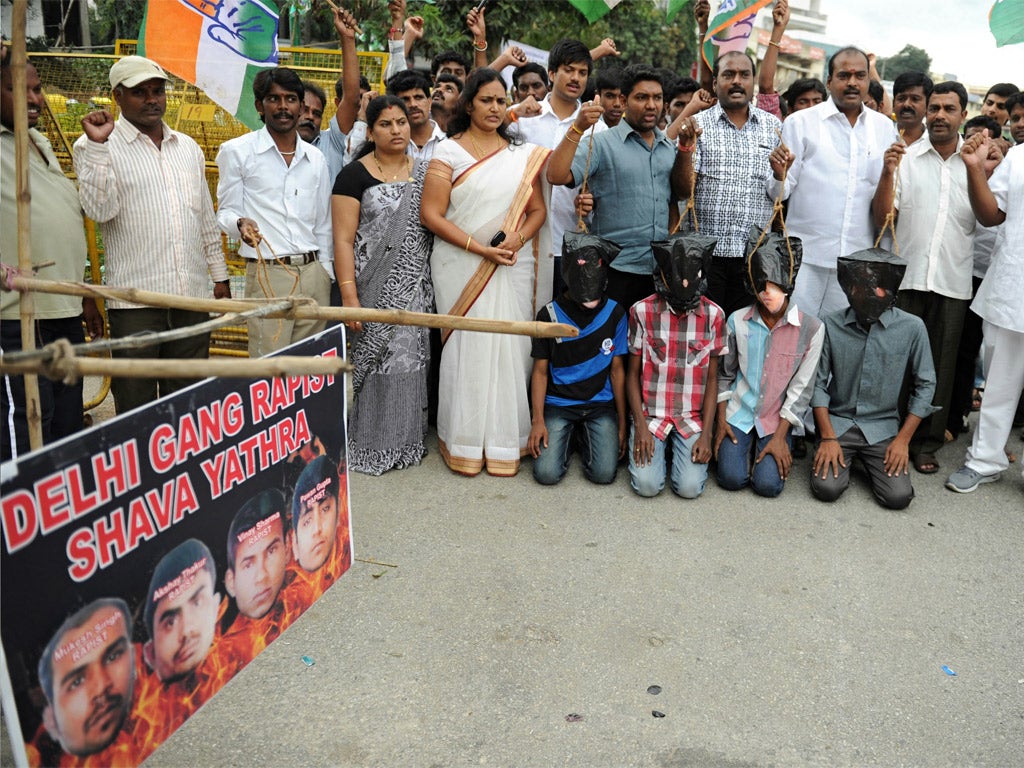'I am a student, I'm not a killer': One of four men accused of a brutal gang-rape and murder that shocked India protests his innocence
The furore over the young woman’s death has subsided. Now questions are being asked

Vinay Sharma’s left arm was in a sling, and blood seeped from a bandage wrapped around his head.
“It happened when I went for lunch,” he told The Independent this week. “Somebody attacked me from behind with a blade... another prisoner. It’s very important news for you.”
The slightly-built, one-time gym instructor is one of four men who were sentenced to death in September after being convicted of the brutal gang-rape and murder of a Delhi student. Yet he continues to protest his innocence.
It has been almost a year since the attack on the 23-year-old physiotherapy student and her male friend, Awindra Pandey, who was powerless to help her as she was set upon when they boarded a private bus after an evening at the cinema watching Life of Pi.
She was brutally gang-raped and tortured with a metal bar for hours before being dumped almost naked on the road side. Mr Pandey recovered from his injuries, but the young woman died two weeks later in a hospital in Singapore, where she had been sent for specialist emergency treatment.
Details of the savage attack sent shockwaves around the world, and prompted mass protests in favour of expanding rights and protection for women. Within days, police said they had arrested four of the six suspects in the case, based on evidence from closed-circuit surveillance cameras. There was widespread approval in India when the men were sentenced to be hanged.
Large parts of the trial – which took place in a courtroom just yards from the shopping centre where the victims had watched the film that night – had been closed to the media, particularly the foreign press. Whenever the defendants were rushed into the court building, their heads were covered with scarves.
Earlier this week, however, as their lawyers began appealing against their conviction, the prisoners were brought to appear before the court with just a fraction of the security that had been present at their trial.
On this occasion they were not even handcuffed to the police officers – simply made to hold hands. Whereas the conclusion of their trial had attracted a huge media scrum, this week, there were just a couple of reporters present.
What was to be learned from looking at these men? Pawan Gupta, a fruit seller, was dressed in a blue shirt; Akshay Kumar Singh, who had cleaned buses, was wearing an orange checked shirt; Mukesh Singh’s face was obscured by a beard and he wore a baseball cap, and Sharma, seated one row in front of his co-defendants, held up his injuries to show to the court.
Though convicted of a notorious crime, the men themselves appeared unremarkable, unworthy of a second glance if you saw them sitting on a train, or indeed, on a bus. Mukesh Singh’s parents had come to court to see him. They stood confused, watching from the sidelines, before being led out of the court room.
With the exception of Sharma, the other men seemed largely uninterested with what was happening. “Two officers beat me,” he said, addressing his comments to the judge, Ms Reva Khetrapal.
Soon the men were led away and AP Singh, a lawyer, started his defence. He represented Sharma and Akshay Kumar Singh, but he said the evidence he intended to bring would also provide an alibi for Gupta. At the time of the trial, AP Singh said the two men were not present on the bus and played no part in the attack. “They were expecting to be found guilty even though they are not,” he said. According to the Press Trust of India, Gupta, said in December last year: “I accept I am guilty, I should be hanged.”
The prosecution had said earlier that the death penalty was necessary in this case to send a message to Indian women that they were safe.

VK Anand, the lawyer for Mukesh Singh, will begin his arguments later this week. At the time of the trial, he said his client had been driving the bus but that he had not been involved in the attack itself. “His role was very limited,” claimed the lawyer. “He had a certain role, a very limited role in the case.”
The defence arguments continued inside. Outside, seated on a bench, awaiting their ride back to Delhi’s Tihar jail, were the four convicted men with their police escorts. It was here that Sharma made a series of dramatic outbursts in reasonable, if imperfect, English.
“I feel very guilty. But I was not involved [in the attack]. I was at a musical event,” he told The Independent, echoing a line his lawyer had told the judge.
“I feel very guilty but I will show you, this is the Indian government. There was media pressure. I will tell you my true story: I am a student, I’m not a killer.”
The young woman’s entire future lay before her as she and her friend boarded that off-duty bus on their way home from the cinema. If he had not raped and assaulted the young woman, then who had?
“I don’t know,” he replied. “I was not aboard the bus.”
One of the six males detained after the 16 December 2012 attack was 17 years old at the time, and was tried as a juvenile. Another, Ram Singh, brother of fellow defendant Mukesh Singh, was found hanging in his prison cell earlier this year.
Sharma claimed he had also been 17 years old, and was now 18. The court says he is 20 years old. He also said he had been offered money for his story from an unidentified British filmmaker and an Indian television news channel, which he did name. The managing editor of the channel adamantly denied that such an offer had been made.
After a few minutes, the police decided the impromptu interview had gone on long enough.
“I was not involved, this is the first time I have been involved with the police,” Sharma insisted, as he was called away by a senior officer. “How is it possible for me to kill that girl?”
Today, India’s Supreme Court accused the Delhi High Court of “rushing” the appeals process, and said it should not continue until the convicts had been given a Hindi translation of the judgment, and final evidence presented during the trial earlier this year.
Join our commenting forum
Join thought-provoking conversations, follow other Independent readers and see their replies
Comments